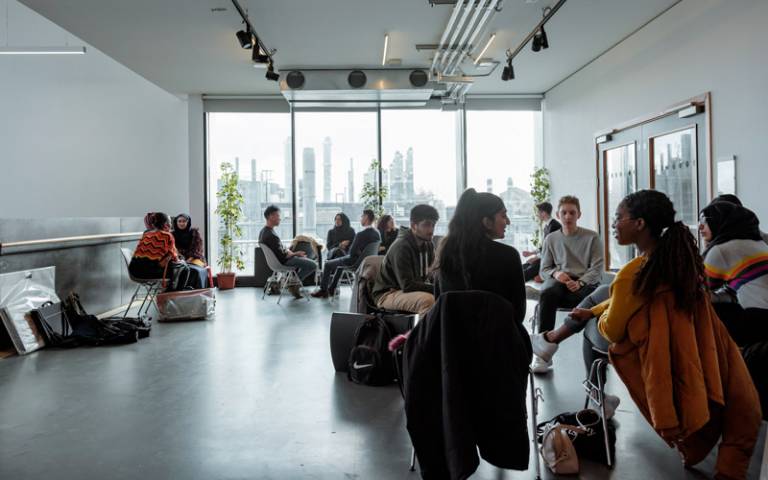The Bartlett launches £1.2m Promise to diversify the sector
11 November 2019
UCL’s Bartlett Faculty of the Built Environment today launches The Bartlett Promise to offer scholarships worth a total of £1.2 million per year to students from under-represented backgrounds.

The Bartlett Promise is a long-term project to attract students from a broader range of backgrounds to tackle the lack of diversity in the sector.
The scholarships are the first stage in the Promise project, and will cover students’ fees, living and study costs for the duration of their degree. For the first year of the Promise, the scholarships are open to students from the UK and EU countries applying to undergraduate degrees in The Bartlett School of Architecture, School of Planning and School of Construction and Project Management.
Scholars will also receive mentoring, personal support and careers advice throughout their studies. Over the next few years, The Promise scholarships will grow to cover all schools and departments of The Bartlett at all levels of study including international applicants.
The Bartlett Promise will help to tackle the lack of diversity within the built environment. According to data compiled in 2019 by the Royal Town Planning Institute from the Office for National Statistics’ Annual Population Survey[1], 59% of planners, 75% of architects and 87% of chartered surveyors are male.
Practitioners from a BAME background make up 3-4% of planning professionals, 9% of architects and 4% of chartered surveyors, even though UK Census data from 2011 shows that 14% of the UK population identifies as coming from a minority ethnic background.[2]
“Society works for everyone when it is shaped by everyone, but right now that’s not happening,” commented Professor Christoph Lindner, Dean of The Bartlett, Faculty of the Built Environment. “We know that the cost of education is a very real barrier for many – The Bartlett Promise will help to address that by removing this barrier to entry whilst providing additional support.
“There are also young people out there whose experience and perspective we desperately need, who never think of applying to The Bartlett because they’ve never met an architect or a planner, a computer scientist or an engineer.
“That’s why, in the next stages of our Promise, we’re investigating how to reach out to primary and secondary schools to help young people understand what the built environment is and how they could play a part in shaping it.”
To qualify for a scholarship, applicants must have a low household income**, but The Bartlett will also look at other criteria, and expects applicants to meet several of them – these include being an ethnic minority, being a care leaver, having been eligible for free school meals, having a disability and living in a neighbourhood that is among the 20% most deprived with a low progression rate to higher education, based on data from the Office for Students’ Participation of Local Areas (POLAR).
"The Promise is about much more than the award itself and its holders, it is a promise to do better by people who are marginalised and made unwelcome in the built environment and its study,” commented Dr Kamna Patel, Vice-Dean Equality, Diversity and Inclusion at The Bartlett.
“The Promise shines a light on how higher education and built environment professions exclude certain voices and experiences. This impacts how urban areas and urbanisation are imagined and planned for. We intend to change that."
The scholarship will initially be open to students applying for nine of The Bartlett’s undergraduate courses. In the first pilot year, up to 10 places will be offered, with this increasing following further funding to 10% of the student population over the following 10 years.
Professor Michael Arthur, UCL President & Provost, said: “The Bartlett has always sought to think radically and to push boundaries. The Promise reflects these traditions in the interests of building a better future. By helping scholarship recipients to study and enter the sector, we are aiming to diversify the environment with which we all interact. Through the Promise, we want to make the built environment profession more inclusive and more representative of the society it works for.”
The Bartlett will introduce further initiatives over the next 10 years as part of The Promise, including new efforts to continue diversifying staff and provide staff training on unconscious bias, leading on diversity, awareness training for inclusion and bespoke training that will be designed in house specifically for The Bartlett Promise.
Links
Image
- Credit: Tim Crocker
Media contact
Kate Corry
Tel: +44 (0)20 3108 6995
Email: k.corry [at] ucl.ac.uk
 Close
Close

